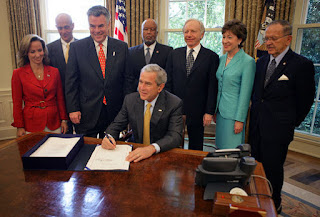 | forre el audio de la dirección de radio 08/04/07 por completo, transcripción del texto. (nota de los redactores: ninguna lengua española mp3 lanzó esta semana, apesadumbrada) PODCAST |
 y recibir la dirección de radio presidencial semanal en inglés y español con informes selectos del departamento del estado. Ofreciendo transcripciones audio y con texto completo verdaderas, más fuentes contentas agregaron a menudo así que la estancia templó.
y recibir la dirección de radio presidencial semanal en inglés y español con informes selectos del departamento del estado. Ofreciendo transcripciones audio y con texto completo verdaderas, más fuentes contentas agregaron a menudo así que la estancia templó.10:54 A.M. EDT
EL PRESIDENTE: Buenos días. Acabo de concluir una reunión con el gabinete. Una de las cosas de las que hablamos fue de la terrible situación allá en Minneapolis. Hablamos sobre el puente que se derrumbó y sobre el hecho de que el gobierno federal debe responder y hacerlo enérgicamente para ayudar a la gente allá no sólo a recuperarse, sino para asegurarse de que esa vía tan importante y activa, ese puente, sea reconstruido lo antes posible.
Con ese fin, la secretaria Peters está en Minneapolis, como también el administrador Capka de la Dirección Federal de Carreteras. Hablé con el gobernador Pawlenty y el alcalde Rybak esta mañana. Les dije que la secretaria iría. Les dije que ayudaremos con el rescate, pero también les hablé sobre cuánto estamos rezando por los que sufrieron. Y les agradezco a mis conciudadanos por apoyar con sus oraciones a las personas que sufren en estos momentos.
También hablamos sobre. en la reunión del gabinete hablamos sobre el estatus de propuestas legislativas importantes ante el Congreso. Dedicamos un buen tiempo a hablar sobre el hecho de que nos sentimos decepcionados porque el Congreso no ha remitido ninguna propuesta de gastos a mi despacho. Al término de esta semana, los miembros del Congreso partirán para su receso de todo el mes de agosto. Y para cuando regresen, quedará menos de un mes para el fin del año fiscal, el 30 de septiembre, y sin embargo, no han aprobado ni una sola de las 12 propuestas de gastos que requieren aprobación. Si el Congreso no aprueba las propuestas de gastos para fines del año fiscal, los secretarios del gabinete nos informan que cabe la posibilidad de que sus departamentos no puedan avanzar con las prioridades urgentes para nuestro país.
Eso no debe suceder. Los demócratas ganaron las elecciones del año pasado con todas las de la ley, y ahora controlan el calendario para considerar proyectos de ley ante el Congreso. Es necesario que aprueben cada una de estas propuestas de gastos individualmente, a tiempo y de manera fiscalmente responsable.
El presupuesto que le he remitido al Congreso financia plenamente las prioridades de Estados Unidos. Aumenta en 6.9 por ciento los gastos discrecionales. Los secretarios de mi gabinete me aseguran que esto es adecuado para atender las necesidades de nuestra nación.
Desafortunadamente, los líderes demócratas en el Congreso quieren gastar mucho más. Su presupuesto propone casi $22,000 millones más en gastos discrecionales tan sólo el próximo año. Estos líderes han tratado de restarle importancia a esa cifra. Ayer uno de ellos dijo que este aumento -y cito- representa "una diferencia muy pequeña" de lo que he propuesto. Solamente en Washington se puede decir que $22,000 millones son una diferencia muy pequeña. Y esa diferencia continuará aumentando. Durante los próximos cinco años, ascenderá a casi $205,000 millones en gastos discrecionales adicionales. Esos $205,000 millones en promedio representan aproximadamente $112 millones por día, $4.7 millones por hora, $78,000 por minuto.
Para ponerlo de otra manera, eso es aproximadamente $1,300 en gastos adicionales cada segundo de cada minuto de cada hora de cada día de cada año durante los próximos cinco años. Eso es muchísimo dinero. incluso para los políticos profesionales en Washington. De hecho, a ese paso, los demócratas en el Congreso hubiesen gastado $300,000 adicionales desde que comencé a hacer estas declaraciones.
Sólo hay una manera de pagar todos estos nuevos gastos federales sin hacer que el déficit aumente, y ésa es aumentar sus impuestos. Un incremento masivo de impuestos es lo último que necesita el pueblo estadounidense. El plan que presenté mantendría bajos los impuestos y lograría el equilibrio presupuestal al cabo de cinco años, y ése es el plan correcto para nuestro país.
Quiero darle las gracias al director de la OMB, Rob Portman, por su arduo trabajo en la formulación de este plan. Para Rob, ésta fue la última reunión de gabinete. Laura y yo les deseamos lo mejor a él y a su familia. E insto al Senado a que confirme a su sucesor, Jim Nussle, para que podamos trabajar juntos para mantener nuestro gobierno en marcha, para mantener nuestra economía en crecimiento y para mantener la solidez de nuestra nación.
Gracias por su tiempo.
END 10:59 A.M. EDT. Para su publicación inmediata, Oficina del Secretario de Prensa, 3 de agosto de 2007
Etiquetas De Technorati: Discurso Radial del Presidente a la Nación, y Presidente Bush and Graphene nanoelectronics: Making tomorrow's computers from a pencil trace and Political Party Symbols Democratic Donkey (jackass) and President Bush Meets with Counterterrorism Team VIDEO PODCAST









